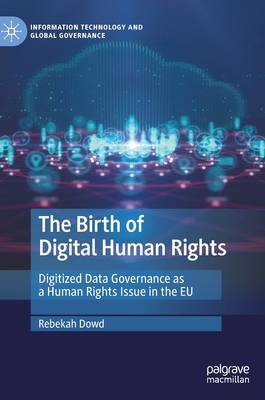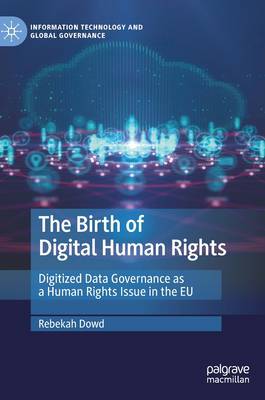
Door een staking bij bpost kan je online bestelling op dit moment iets langer onderweg zijn dan voorzien. Dringend iets nodig? Onze winkels ontvangen jou met open armen!
- Afhalen na 1 uur in een winkel met voorraad
- Gratis thuislevering in België vanaf € 30
- Ruim aanbod met 7 miljoen producten
Door een staking bij bpost kan je online bestelling op dit moment iets langer onderweg zijn dan voorzien. Dringend iets nodig? Onze winkels ontvangen jou met open armen!
- Afhalen na 1 uur in een winkel met voorraad
- Gratis thuislevering in België vanaf € 30
- Ruim aanbod met 7 miljoen producten
Zoeken
The Birth of Digital Human Rights
Digitized Data Governance as a Human Rights Issue in the EU
Rebekah Dowd
€ 126,95
+ 253 punten
Uitvoering
Omschrijving
This book considers contested responsibilities between the public and private sectors over the use of online data, detailing exactly how digital human rights evolved in specific European states and gradually became a part of the European Union framework of legal protections. The author uniquely examines why and how European lawmakers linked digital data protection to fundamental human rights, something heretofore not explained in other works on general data governance and data privacy. In particular, this work examines the utilization of national and European Union institutional arrangements as a location for activism by legal and academic consultants and by first-mover states who legislated digital human rights beginning in the 1970s. By tracing the way that EU Member States and non-state actors utilized the structure of EU bodies to create the new norm of digital human rights, readers will learn about the process of expanding the scope of human rights protections within multipledimensions of European political space. The project will be informative to scholar, student, and layperson, as it examines a new and evolving area of technology governance - the human rights of digital data use by the public and private sectors.
Specificaties
Betrokkenen
- Auteur(s):
- Uitgeverij:
Inhoud
- Aantal bladzijden:
- 274
- Taal:
- Engels
- Reeks:
Eigenschappen
- Productcode (EAN):
- 9783030829681
- Verschijningsdatum:
- 18/11/2021
- Uitvoering:
- Hardcover
- Formaat:
- Genaaid
- Afmetingen:
- 148 mm x 210 mm
- Gewicht:
- 535 g

Alleen bij Standaard Boekhandel
+ 253 punten op je klantenkaart van Standaard Boekhandel
Beoordelingen
We publiceren alleen reviews die voldoen aan de voorwaarden voor reviews. Bekijk onze voorwaarden voor reviews.











